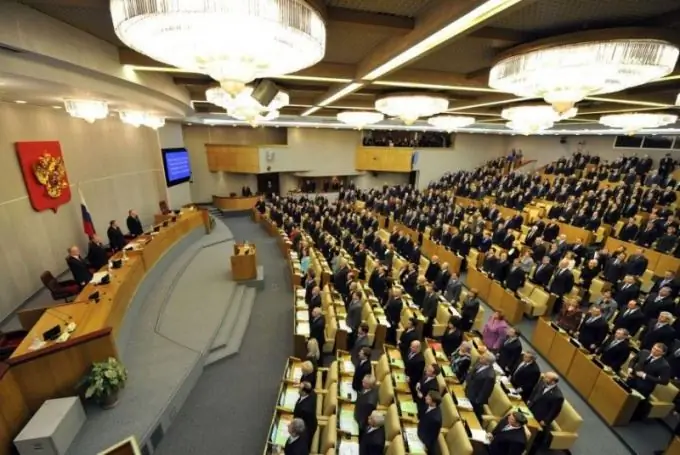- Author Antonio Harrison harrison@cultureoeuvre.com.
- Public 2023-12-16 07:44.
- Last modified 2025-01-22 21:44.
The role of parliament in society is to express the will of the people, pass laws and influence the processes of managing the budget, taxes and global changes in the country. The Parliament of Russia consists of two chambers - upper and lower, which have different tasks in the legislative process.

Instructions
Step 1
In a country where the division of power is envisaged, the parliament is one of the branches of power. There are three of them: legislative, executive and judicial. Parliament is the legislature because only its representatives have the right to propose and pass laws. Parliament is a representative body, that is, parliamentarians represent the people of the country, its inhabitants, express their will and interests. Moreover, the parliament, unlike local authorities, does not represent the interests of some part of the population, say, a region or a city, but the will of the entire nation.
Step 2
As a national legislative body, the parliament does not solve private and secondary problems, but takes an active part in important issues of the life of society, legislating global changes in the country. Parliament not only puts forward for discussion and adopts laws and amendments to them, but also adopts the state budget, exercises control over its funds, sets the amount of taxes, sets the terms and rules for the election of high officials of the state, for example, the president, government, rules for approving ministers and the prime minister. minister, election of judges.
Step 3
The special role of parliament can be noted in the issues of impeachment of the incumbent president, passing a vote of no confidence in the government, assigning an amnesty, carrying out international agreements, declaring war, and establishing peace.
Step 4
Most of the world's parliaments are divided into two chambers - upper and lower. The laws of modern democracy require that at least one of the chambers of parliament be elected, that is, it contains representatives who have been elected by the population of the country in different regions. Members of the lower house of parliament are called MPs, members of the upper house are called senators.
Step 5
In the Russian Federation, the parliament is called the Federal Assembly and consists of two chambers. The Federation Council is the upper house of parliament, the State Duma is the lower house of parliament. The Federation Council consists of 170 appointed senators (two from each subject of the federation), while the State Duma consists of 450 elected deputies.
Step 6
The idea of dividing parliament into two chambers is to pass laws in several stages. First, bills are put forward and discussed by the lower house of parliament, sometimes going through several readings for this. If a law is passed by the lower house of parliament, it often has to be approved by the upper house as well, only after that the law can be considered adopted and come into force. The upper house of parliament has the right to intervene in the legislative process only if the bill changes the country's constitution.






